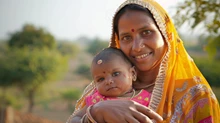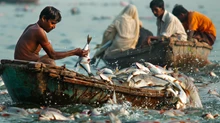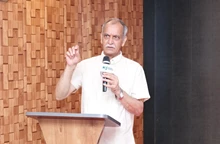
To identify geogenic and anthropogenic pollutants in the surface and groundwater, the National Institute of Hydrology in Roorkee has conducted several studies over a period of 5 years to come up with methods for water treatment along with which they have constructed a wetland-based treatment system and a river rejuvenation on the request of Govt. of Uttarakhand.
The results of the multiple researches conducted by NIH were communicated with concerned stakeholders through a series of workshops. On water conservation and water treatment measures. They have developed the wetland based natural treatment system for domestic wastewater on the fields. A fluoride removal medium has also been built with the help of bagasse fly ash.
Central Ground Water Board has come up with a plan to construct arsenic-contaminant free exploratory wells which will be able to tap into the arsenic-safe deeper aquifers along with a special technique of cement ceiling especially in the Indo-Gangetic plain area. Special attention has been given to groundwater contamination under the National Aquifer Mapping Programme by Central Ground Water Board. These exploratory wells are constructed in the states of West Bengal, Bihar and Uttar Pradesh. A total of 513 such wells have been constructed under the programme.
The objective of the programme is to demarcate and characterize aquifers for the preparation of operative plans. Out of 25 lakh sq km area, an area of 24.3 lakh sq km has already been covered under National Aquifer Mapping Programme studies. To disseminate knowledge of these studies amongst grassroot, Public Interaction Programme have been set up by the State Government. Till now, 1300 PIPs have been organized with participation from 1 lakh people.
The Department of Science and Technology’s Water Technology Initiative has been taken up to uplift the knowledge of application-led research to develop indigenous, pocket-friendly, and powerful solutions to face water-related challenges such as water contamination with arsenic, fluorides, iron, and nitrates and tackle desalination as well. The purpose of the initiative also follows solution-based approaches and deals with lab-proven technologies to provide safe drinking water to the citizens.
Water Quality labs have been set up by the Department of Science and Technology in association with State Governments and Research and Development institutes. Maps denoting water quality have been prepared to locate areas requiring more attention along with the preparation of simple and cost-effective water monitoring kits.
Local tribes and indigenous people of North-East region have undertaken scientific dissemination and improvement of water management practices, like Brahmaputra Board Water management Practices of Apatani inhabited Ziro Valley in Arunachal Pradesh, Roza Water conservation practices of Chakhesang tribe of Phek district in Nagaland and Dong Water management practices of Bodo tribe of BTC area in Assam.
Ministry of Jal Shakti has initiated Jal Shakti Abhiyan-I, conducted in 2019 in 1592 blocks out of 2836 blocks in 256 water stressed districts, later expanded as “Jal Shakti Abhiyan: Catch the Rain” in 2021 with the theme of “Catch the Rain – Where it Falls When it Falls” to cover all the blocks across the country. “Jal Shakti Abhiyan: Catch the Rain”-2022 campaign, the third in the series, was launched on March 29.











